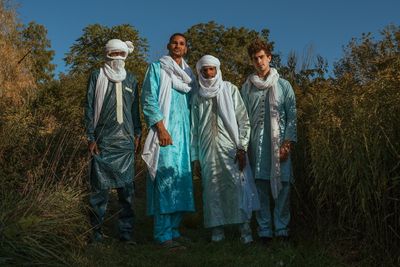Mdou Moctar Treads Lightly On 'Afrique Refait' Remix Album
The Niger guitarist and songwriter gets remixed by many of Africa's cutting-edge electronic producers in Afrique Refait.
Mdou Moctar, Niger's maverick songwriter, puts down his guitar and lets others have a go on the release of Afrique Refait—a remix of last year's outstanding Afrique VictimeLP on US imprint Matador Records.
An album that blazes with the crystallized energy of the Sahara: Afrique Victime stands up as a furious attack on the French military's presence in his home region of the Sahel and takes the listener on a psychedelic death trip—from fury to genuine sorrow and back again.
Moctar has gone from local hero in his city of Agadez to international acclaim; having his music widely shared on Bluetooth from one cellphone to another in Niger, to being constantly on the road across the U.S. and the rest of the world. His 2015 Rain the Color of Blue with A Little Red In It, a remake of Prince's Purple Rain movie, set in the desert rather than in Minneapolis was outrageously inspiring and demonstrated that he could more than live up to the bill as a challenging artist with universal appeal.
Afrique Refait, which seems to be driven by Moctar's producer and bassist Mikey Coltun, takes the album away from the infinite cosmos and into the studios of many of Africa's cutting-edge electronic producers. As a means to support and bring attention to African artists as well as keeping Afrique Victime in the spotlight, it manages to largely offer only a spotty take on the original songs and damp evidence to what these artists are capable of when creating music from scratch.
Remixing music is much like translating text from one language to another. If done so word by word you are only left with clunky sentences. It is the spirit of the text that makes the work ring true and in the case of remixes—you want less of the original work and more of the remixer's interpretation.
Album opener "Chismiten" is a classic example of this. Jay Mitra, the Singelli genius of Dar es Salaam in Tanzania, delivers a track that falls between two stools and feels stodgy in comparison. Too much of the original track is fused lifelessly into the new rhythms leaving you left like you are listening to a missed opportunity more than anything else.
MC Yallah and Debmaster come together to reinterpret "Tala Tannam." Yallah, the Kenyan/Ugandan rapper, rides the rhythm with her smooth and purposeful flow that she has triumphantly showcased across the globe of late but her track here fizzles out without having taken you on the journey you would expect when exploring Moctar's world.
Doomy drunk lords Duma get the idea with their take on "Untitled" and they do not fail. A duo who take great pride in pushing satanic imagery from Nairobi to the world, embrace their self destruction and lack of self-control by kicking the door off the track's hinges to ransack the studio. Theirs is a devouring of its children in hell, leaving very little remains. And this is the point.
Kenya's Kabeaushé carry on in a similar vein by taking the reins with an insanely positive take on the original album's title track. Seizing command of the wondrous energy of Moctar's guitar solos they escort you into their bold 80s-infused universe. One that may be far from Afrique Victime's falling bombs and delirious agonies, but one they call home all the same.
DJ Diaki of Mali manages to steal everyone's thunder and his take is so good that he is not given one remix but four to end the album with alone. In his first, he turns up a hidden and gloriously scratchy rhythm guitar and puts his giddy energy all over it, creating a track that sounds like it could have been written by Ian Dury and the Blockheads’ support act in the 1970s or be the soundtrack to a pilled-up forest rave in Angola in 2022. It has the energy to make you want to smash up your bedroom, and then your neighbours' too.
He then proceeds to do it again by soloing other tracks. The bass remix shows exactly how Mikey Coltun got into Moctar's band in the first place with a groove to spiral your brain into party central. It is as spirituous as sliding down a hill and DJ Diaki keeps up all the way with beats that come at you like snapping turtles. The guitar remix pushes up the frenzied Hendrix-like dervish energy and matches it with four to the floor kick and yet more frenetic drums.
His last track with sped-up vocal and whacked-out rhythms brings the album to a close with a hint of what finally could have been. Kept simple and DIY, the artist here takes one element from the track alone and makes it his own without a care in the world.
Moctar has come a long way from playing weddings back home and being a Bluetooth viral sensation. He has set his own world alight to the point of even becoming a beacon for other artists across Africa. Rather than move to LA he has helped build and maintain a community in the Sahel that remains in genuine need; Afrique Victime was a testament to that. The remix album could have been a truly out-there experimental deconstruction of the original record by pushing it to its very limits, instead of being so precious it may not have sounded so profane.
- Mdou Moctar Explains the Meaning of 'Afrique Victime' - OkayAfrica ›
- Mdou Moctar Announces Debut Album 'Afrique Victime ... ›
- A Tuareg Remake Of 'Purple Rain' Starring Mdou Moctar - OkayAfrica ›
